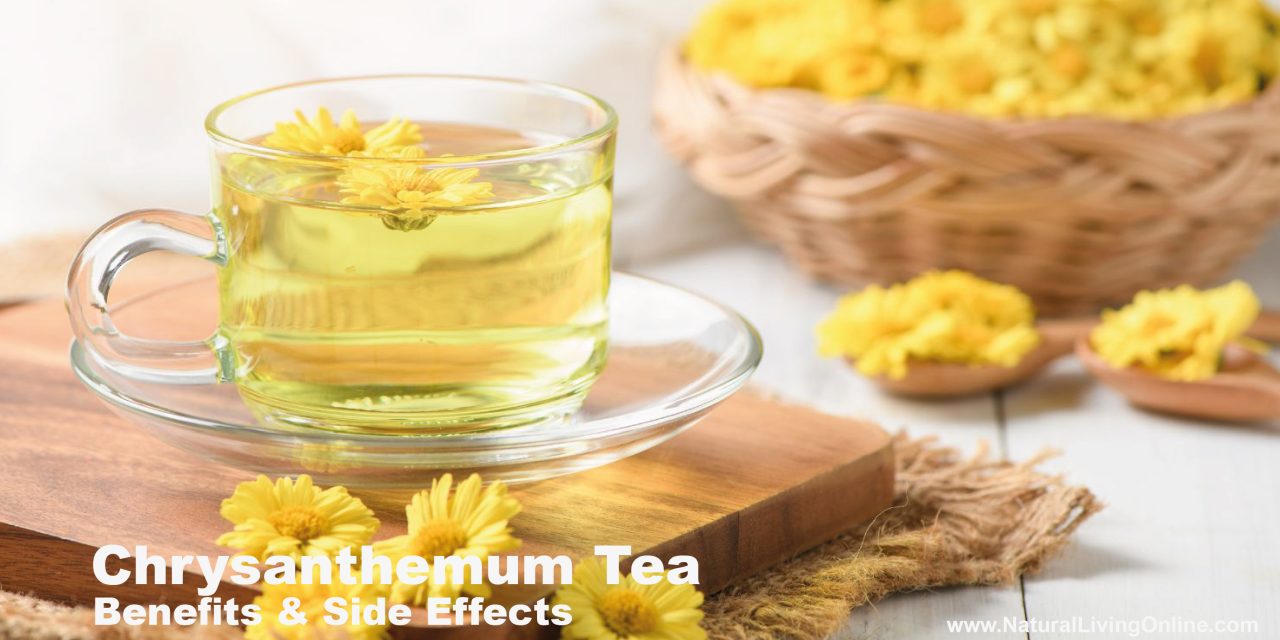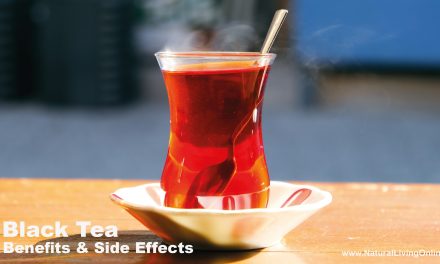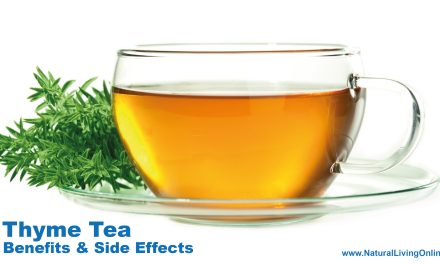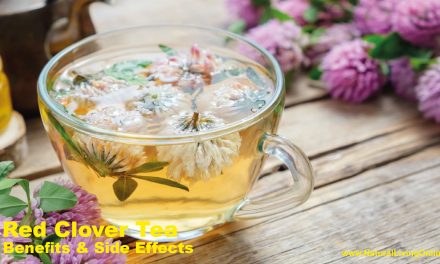Chrysanthemum tea has been enjoyed for centuries in many Asian cultures. This fragrant herbal drink comes from steeping the dried flowers of the chrysanthemum plant in hot water. It has a light, floral taste and is often served both hot and cold.
Chrysanthemum tea may offer several health benefits, including reducing inflammation, supporting eye health, and boosting the immune system. Some studies suggest it contains antioxidants that could help protect cells from damage. The tea is also caffeine-free, making it a good option for those looking to cut back on caffeine.
While generally safe for most people, chrysanthemum tea can cause side effects in some. People with allergies to ragweed or daisies may experience skin reactions like redness or itching. It’s always best to start with a small amount when trying any new herbal tea. Pregnant women and those on certain medications should check with a doctor before drinking chrysanthemum tea regularly.
Key Takeaways
- Chrysanthemum tea is a caffeine-free herbal drink with potential health benefits.
- The tea may cause allergic reactions in some people sensitive to related plants.
- Consult a healthcare provider before adding chrysanthemum tea to your regular diet.
Origins and Traditions

Chrysanthemum tea has deep roots in East Asian culture and medicine. It has been used for centuries as both a medicinal remedy and a symbol in art and tradition.
Historical Use in Traditional Chinese Medicine
Chrysanthemum tea has been used in Traditional Chinese Medicine (TCM) for over 3,000 years. TCM practitioners value the flower for its cooling and calming properties. They often prescribe it to treat fevers, headaches, and eye problems.
The tea is made from the dried flowers of the chrysanthemum plant. Different varieties are used for different purposes. White chrysanthemums are thought to be best for reducing fever. Yellow ones are believed to help with liver problems.
In TCM, chrysanthemum tea is considered a “yin” food. This means it has cooling effects on the body. It’s often used to balance “yang” or heat in the body.
Cultural Significance of Chrysanthemums
Chrysanthemums hold great importance in East Asian culture, beyond their medicinal use. In China, the flower is one of the “Four Gentlemen” in Chinese art. It represents autumn and is a symbol of nobility.
In Japan, the chrysanthemum is the official seal of the Emperor. It appears on passports and some Japanese coins. The flower is also celebrated in the “Festival of Happiness” each year.
Chrysanthemum tea is often served at important events and gatherings. In Korea, it’s a popular drink during the Chuseok harvest festival. The tea is seen as a way to promote longevity and good health.
Many East Asian poets and artists have featured chrysanthemums in their work. The flower often represents ideals of simplicity, integrity, and nobility in these artistic expressions.
Health Benefits
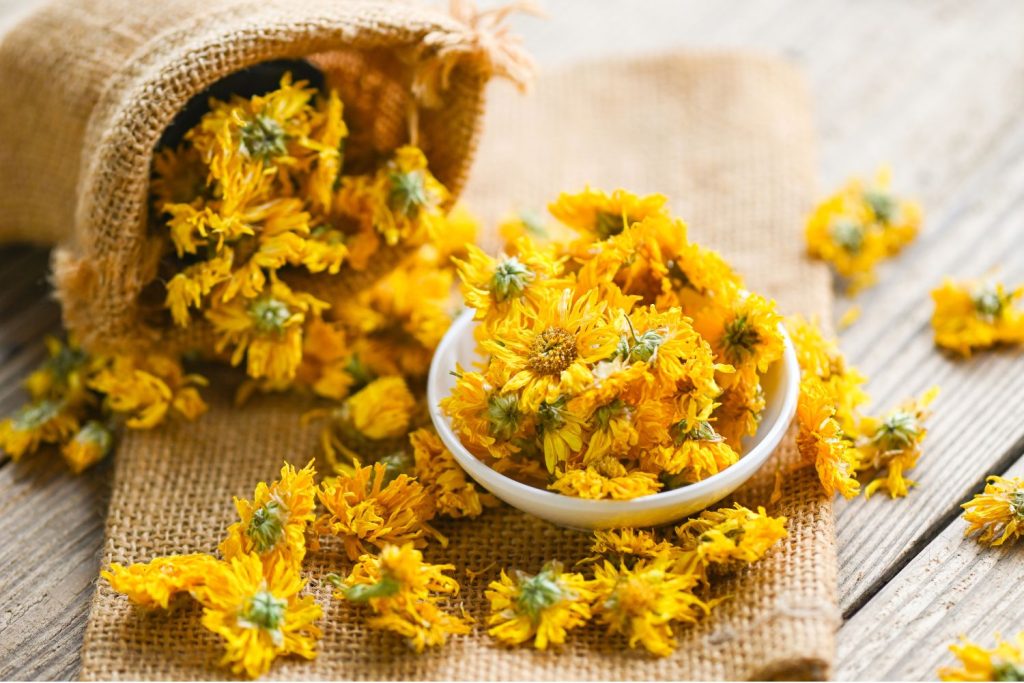
Chrysanthemum tea offers many potential health advantages. It contains helpful compounds that may boost wellness in several ways.
Antioxidant Properties and Heart Health
Chrysanthemum tea is rich in antioxidants called flavonoids. These fight harmful free radicals in the body. By reducing oxidative stress, the tea may help protect heart health.
Some studies suggest it could lower blood pressure and cholesterol. This may cut the risk of heart disease. The tea’s anti-inflammatory effects might also help blood vessels stay healthy.
Drinking chrysanthemum tea regularly could support overall heart function. Its antioxidants may reduce cell damage in the cardiovascular system.
Anti-Inflammatory Effects and Skin Health
The anti-inflammatory properties of chrysanthemum tea may benefit skin health. It could help calm skin irritation and redness.
Some people use it to soothe skin rashes or eczema. The tea’s compounds might reduce inflammation both inside and outside the body.
Drinking the tea or applying it topically may promote clearer, healthier-looking skin. Its antioxidants could protect skin cells from damage caused by sun exposure and aging.
Immune System Support and Respiratory Benefits
Chrysanthemum tea may help boost the immune system. It contains vitamins and minerals that support immune function.
The tea’s anti-inflammatory effects could ease respiratory symptoms. It might help relieve congestion and soothe sore throats.
Some use it to manage allergies or asthma symptoms. Its compounds may help open airways and reduce inflammation in the lungs.
Regular consumption might strengthen the body’s defenses against illness. The tea could be especially helpful during cold and flu season.
Support for Eye Health and Vision
Chrysanthemum tea may offer benefits for eye health. It contains compounds that could protect against eye diseases.
The tea’s antioxidants might help prevent macular degeneration. This is a common cause of vision loss in older adults.
Some studies suggest it could reduce eye strain and fatigue. This may be helpful for people who spend long hours looking at screens.
The tea’s nutrients might support overall eye function and health. Regular consumption could contribute to maintaining good vision as we age.
Preparation and Usage

Brewing chrysanthemum tea is simple and rewarding. The process yields a caffeine-free drink that promotes relaxation and calmness. Adding other ingredients can enhance its taste and benefits.
How to Brew Chrysanthemum Tea
To make chrysanthemum tea, start with dried chrysanthemum flowers. Use 3-6 flowers for every 8 ounces of water. Boil the water and pour it over the flowers in a cup or teapot.
Let the tea steep for 5-10 minutes. The longer it steeps, the stronger the flavor becomes. Use a strainer to remove the flowers when pouring the tea into a cup.
For a sweeter taste, add honey or another natural sweetener. Some people enjoy the tea’s mild, floral flavor without any additives.
Cold brew is another option. Place the flowers in cold water and refrigerate for several hours or overnight. This method creates a refreshing iced tea perfect for hot days.
Advisable Combinations with Other Ingredients
Chrysanthemum tea pairs well with various ingredients to enhance its taste and health benefits. Adding goji berries can increase antioxidant content and provide a subtle sweetness.
Combining chrysanthemum with mint leaves creates a refreshing blend that may aid digestion. For a warming effect, try adding a slice of fresh ginger to the tea.
Some people mix chrysanthemum with other flowers like jasmine or rose for a more complex floral flavor. These combinations can offer unique aromatic experiences.
Lemon or honey can be added to boost vitamin C content and provide additional antibacterial properties. These additions also help balance the tea’s delicate flavor profile.
Potential Side Effects and Precautions
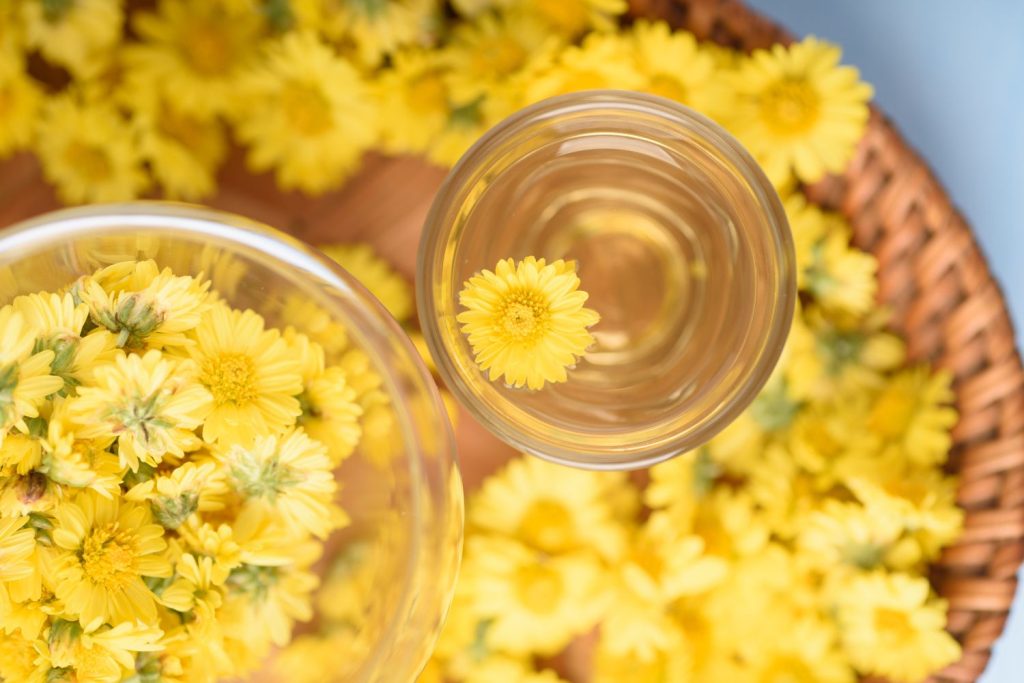
Chrysanthemum tea can have side effects and may not be safe for everyone. Some people might have allergic reactions or experience drug interactions.
Allergies and Drug Interactions
People with allergies to ragweed or daisies may also be allergic to chrysanthemum tea. Signs of an allergic reaction can include skin rash, itching, or swelling. In rare cases, a severe reaction called anaphylaxis can occur.
Chrysanthemum tea might interact with certain medications. It’s important to talk to a doctor before drinking this tea if you take any drugs regularly.
Some people may get more sensitive to sunlight after drinking chrysanthemum tea. This could lead to easier sunburns.
Considerations for Specific Groups
Pregnant women should be careful with chrysanthemum tea. Not enough research has been done to know if it’s safe during pregnancy.
People with weak immune systems might need to avoid this tea. It could increase the risk of infections.
Children and older adults should drink less chrysanthemum tea than healthy adults. Their bodies may react differently to the tea’s compounds.
Anyone with liver or kidney problems should check with a doctor before drinking chrysanthemum tea regularly.
Nutritional Profile
Chrysanthemum tea offers a range of nutrients. It contains small amounts of protein, fat, and carbohydrates.
A typical serving of chrysanthemum tea provides about 1.71 grams of protein, 0.286 grams of fat, and 1.54 grams of carbohydrates.
This herbal tea is low in calories, making it a good choice for those watching their calorie intake.
Chrysanthemum tea is rich in antioxidants. These compounds help protect cells from damage caused by free radicals.
The tea contains several vitamins and minerals:
- Vitamin A
- Potassium
- Calcium
- Magnesium
- Iron
These nutrients play key roles in various bodily functions. For example, vitamin A supports eye health, while calcium and magnesium contribute to bone health.
Chrysanthemum tea is also a good source of fiber. A typical serving contains about 1.53 grams of fiber.
The tea contains no sugar, making it a suitable option for those looking to reduce their sugar intake.
It’s important to note that the exact nutritional content may vary depending on how the tea is prepared and the specific variety of chrysanthemum used.
Frequently Asked Questions
What are the potential benefits of drinking chrysanthemum tea for overall health?
Chrysanthemum tea may provide several health benefits. It contains antioxidants and minerals that could help reduce inflammation and regulate bodily functions. The tea might also support immune health and promote relaxation. Some studies suggest chrysanthemum tea may have anti-obesity properties. Research has shown that chrysanthemum leaf extract helped prevent obesity in mice.
Can consuming chrysanthemum tea improve skin health?
Chrysanthemum tea might have positive effects on skin health. Its antioxidant content could potentially help protect the skin from damage caused by free radicals. The tea’s cooling properties may also help soothe skin irritation. However, more research is needed to confirm these effects on human skin.
Are there any adverse reactions associated with drinking chrysanthemum tea regularly?
While chrysanthemum tea is generally considered safe, some people may experience side effects. Skin rashes or contact dermatitis are possible reactions when handling or consuming chrysanthemum. Increased sensitivity to sunlight is another potential side effect. It’s important to consult a healthcare professional if any adverse reactions occur.
What is the best time of day to consume chrysanthemum tea for its maximum benefits?
The best time to drink chrysanthemum tea may vary depending on individual needs. As it is caffeine-free, it can be enjoyed at any time without disrupting sleep patterns. Some people prefer to drink it in the evening to promote relaxation. Others may find it refreshing in the morning or throughout the day.
Does chrysanthemum tea have any specific effects on hair health?
There is limited scientific evidence regarding chrysanthemum tea’s direct effects on hair health. While some claim it may promote hair growth or strength, more research is needed to confirm these benefits. The tea’s overall health benefits, such as its antioxidant properties, may indirectly support hair health by promoting general well-being.
Could drinking chrysanthemum tea affect blood pressure levels?
Chrysanthemum tea may have an impact on blood pressure. Some studies suggest it might help lower blood pressure. However, more research is needed to determine its exact effects on blood pressure. People with blood pressure concerns should consult their doctor before adding chrysanthemum tea to their diet.
References:
Phytochemicals, therapeutic benefits and applications of chrysanthemum flower: A review
Chemical compositions of chrysanthemum teas and their anti-inflammatory and antioxidant properties
This website does not provide medical advice.
All information provided on this website, and on associated social media networks, including but not limited to texts, images, and numbers are for general information purpose only. It is not intended as medical advice and it does not include all possible precautions, side effects, or interactions that may occur. Neither NaturalLivingOnline.com nor its author/founder take responsibility for how you use this information. Statements contained on NaturalLivingOnline.com have not been evaluated by the FDA. You should conduct thorough research via multiple sources and consult your physician or qualified doctor before using any essential oil or herbal remedy. Information on NaturalLivingOnline.com must not be relied upon for medical, legal, financial or other decisions.

